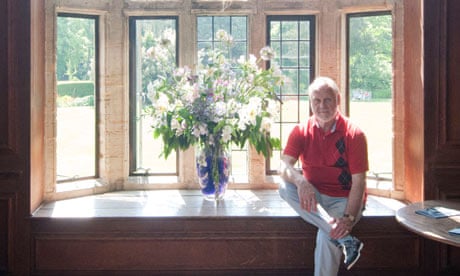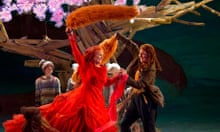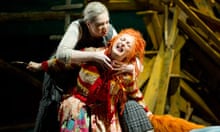Who you playing?
I'm singing the forester. He's a man who has just gone about his daily routines in the forest for years, but then one day he spies a young fox and decides - for no particular reason, maybe just because of a sparkle in his mind - to bring her home. The opera is about this special relationship. It's not love in the human sense of the word, but the forester understands that something very strange that connects him to that young fox. When she escapes from him, his first thought is to hunt and kill her - because she destroyed his chickens and brought disaster to his family, but then, step by step, he understands he can't survive without her. When she's killed by the poacher, the forester feels emptiness in his heart and soul - without the vixen, the world is not the same, but she eventually helps him feel part of nature, she helps him understand it. That's why at the end he can understand, in the opera's final scene, what the frog tells him.
Tell us about the music...
This is my first experience of Czech music and of singing in Czech. It's difficult of course, and nor is Janácek's music is simple technically, but the Czeck language gives a special flavour to the piece. Musically I don't think it could be better conducted - Vladimir Jurowski understands it completely. My favourite moment is the Forester's last aria - I look forward all the opera to singing it! It's not an aria the way we understand, say, Puccini's arias. It's a monologue, brilliantly done by Janácek, and a glorious moment for my character, and the key for the whole philosphical idea of the opera - how nature renews itself.
... and the production?
It's bright and detailed, but it's not a children's production with cute animals. It's something to watch several times - you can't absorb everything on one viewing only. It's philosophical - it makes you think. I'm telling everyone that you must see this production to be more good!
Finally, what's the best thing about Glyndebourne?
The weather of course - when it's good! I hope it will continue to be as sunny as these last few days [we're speaking late May during a mini heatwave]. The Glyndebourne experience is about relaxing and picnicking and getting close to nature. After all this - human beings and nature - is what is in the magic of Janácek's Cunning Little Vixen.





